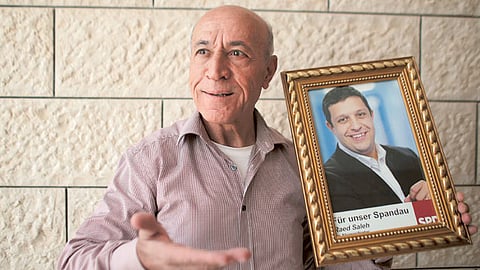Palestinian-born candidate runs for Berlin mayor post
Raed Saleh seeking to become German city’s first immigrant mayor

BERLIN: Berlin’s mayor broke ground 13 years ago by winning the elections after coming out as gay. Now a top candidate to succeed him wants to make history of his own: Palestinian-born Raed Saleh is seeking to become Berlin’s first immigrant mayor.
Saleh, who was born in the West Bank and came to Berlin at age five, offers a story of social advancement he hopes will win over voters and set an example for others.
The son of a Palestinian “guest worker” who brought his family to then-West Berlin in the early 1980s, the 37-year-old Saleh started out working at Burger King and later cofounded a company that offers printing services.
“At the moment, a lot of young people have the feeling they don’t have a share” in society, he told The Associated Press. Berlin is home to a large immigrant community, including many people with Turkish roots, some of them poorly integrated.
Saleh joined the centre-left Social Democrats of the current mayor, Klaus Wowereit, at 18 and rose steadily up the local party hierarchy. When Wowereit announced in August he was stepping down, Saleh — now the party’s regional caucus leader — became a natural candidate to succeed him.
Members of the Social Democrats are choosing between Saleh and two other contenders to be their party’s pick in a postal ballot that closes October 17. The mayor will be elected by the Berlin state parliament in December. Since a Social Democrat-led coalition has a majority in the legislature, the party ballot’s winner is all but guaranteed to get the job.
Saleh says his election could help give “courage and hope” to millions of people, showing that everyone is equal regardless of where they were born.
“This would of course be a great signal and we would make history together here in Berlin,” he said.
Saleh pledges to focus on education and take personal control of attracting business to the city.
Berlin has developed a reputation as a hub for high-tech start-ups, but is industrially weak and has not developed a strong financial centre. Wowereit dubbed the city “poor but sexy.” Its 10.8-per cent unemployment rate is still the second-highest of any German state, well above the national average of 6.5 per cent.
“Berlin is growing, Berlin is developing very positively, but many people have no share in this growth — for many, everything that is happening is passing them by,” Saleh said. “I would like us to share prosperity around better.”
Saleh also promises to ensure law and order and has taken an outspoken stance against anti-Semitic slogans chanted during protests against the Gaza war. “You can criticise if you have a different political view,” he said, “but nothing justifies hatred of Jews.”
Wowereit’s decision to step down midterm gives the new mayor nearly two years before the next state election to shore up his party’s support. That has slid amid disillusionment with the long-popular Wowereit, whose personal reputation suffered from persistent delays in opening Berlin’s new airport.
Saleh’s chances are hard to gauge in a battle with local party chairman Jan Stoess and city development minister Michael Mueller, the best-known of three candidates who are hardly household names.
Ethnic minorities are poorly represented in leadership positions in Germany, though a co-leader of the opposition Greens and the federal government official responsible for immigrant issues have Turkish roots.
Saleh said in a letter to party members that he has heard questions about whether Berlin is ready for a mayor with immigrant roots.
“I think that is asking the question the wrong way,” he wrote. “It should be: Are we ready? Are you ready?”


